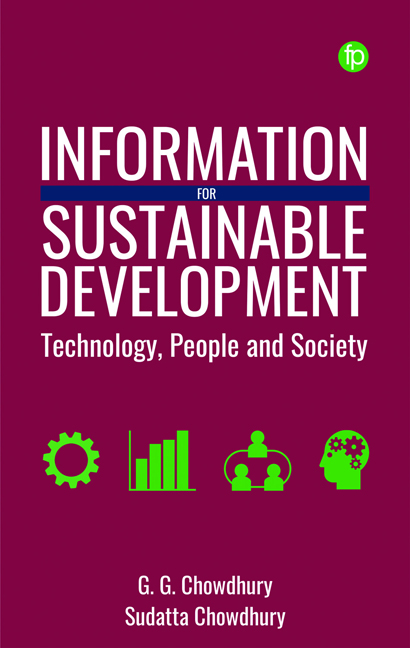Book contents
- Frontmatter
- Dedication
- Contents
- Figures
- Tables
- About the Authors
- Introduction
- 1 Data, Information, People and Society
- 2 Information and the Sustainable Development Goals
- 3 Sustainable Development Goals: Targets and Indicators
- 4 Data, Information and Progress in SDGs
- 5 Capacity, Co-operation and Sharing of Data for SDGs
- 6 People and the SDGs: the Digital Divide
- 7 People and the SDGs: Access to Data and Digital Skills
- 8 Information Skills and the SDGs in Everyday Life
- 9 Information, Education and Sustainable Development
- 10 Research and Development Around the SDGs
- 11 Information Education, Research and Professional Developments Around SDGs
- References
- Index
11 - Information Education, Research and Professional Developments Around SDGs
Published online by Cambridge University Press: 13 April 2024
- Frontmatter
- Dedication
- Contents
- Figures
- Tables
- About the Authors
- Introduction
- 1 Data, Information, People and Society
- 2 Information and the Sustainable Development Goals
- 3 Sustainable Development Goals: Targets and Indicators
- 4 Data, Information and Progress in SDGs
- 5 Capacity, Co-operation and Sharing of Data for SDGs
- 6 People and the SDGs: the Digital Divide
- 7 People and the SDGs: Access to Data and Digital Skills
- 8 Information Skills and the SDGs in Everyday Life
- 9 Information, Education and Sustainable Development
- 10 Research and Development Around the SDGs
- 11 Information Education, Research and Professional Developments Around SDGs
- References
- Index
Summary
Introduction
‘There is no truly sustainable development without access to information and no meaningful, inclusive access to information without libraries’, remarked Donna Scheeder, the former President of IFLA (Scheeder, 2019). Libraries, and the information services sector in general, can contribute hugely to achieve the UN SDGs by:
• Promoting universal literacy, including media and information literacy, and digital literacy skills
• Closing gaps in access to information and helping government, civil society and business to better understand local information needs
• Providing a network of delivery sites for government programmes and services
• Advancing digital inclusion through access to ICT, and dedicated staff to help people develop new digital skills
• Serving as the heart of the research and academic community
• Preserving and providing access to the world's culture and heritage. ‘Programmes for children, women, adults and other marginalized populations’ make an important contribution to achieving universal literacy. (https://sdgs.un.org/partnerships/contribution-libraries-sdgs)
‘Literacy is imperative in developing sustainable and inclusive societies’, says Arne Carlsen, Director of the UNESCO Institute for Lifelong Learning (UIL) (Carlsen, 2015). SDG4 intends to ensure inclusive and equitable quality education and promote lifelong learning opportunities for all. This implies that all people, ‘irrespective of gender, age, race or ethnicity, including persons with disabilities, indigenous peoples, children and youth in vulnerable situations, should have access to learning that helps them acquire the knowledge and skills needed to exploit opportunities and to participate fully in society’ (UNESCO, 2015b). As discussed in Chapter 9, education for sustainable development has been identified by UNESCO as a core requirement for achieving success in the SDGs.
However, education for sustainable development has yet not been fully embedded in information sciences curricula. A few discussions and thoughts have been put forward by some researchers and professional associations, which are discussed in this chapter. Similarly, some research papers have been published in the recent past by researchers and professionals in the information science discipline, and initiatives have been taken by the information services sector in examining the role of information for sustainable development. Some of these research and development activities are discussed in this chapter with a view to showing some key trends, as well as challenges.
- Type
- Chapter
- Information
- Information for Sustainable DevelopmentTechnology, People and Society, pp. 195 - 218Publisher: FacetPrint publication year: 2024

